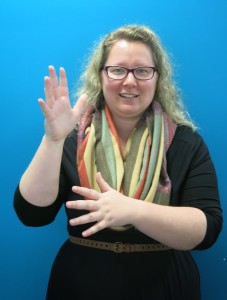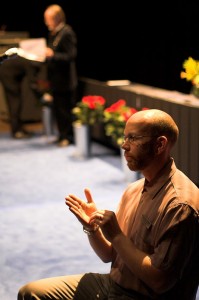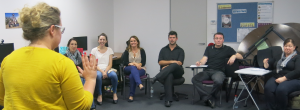 A move to Finland where she learned Finnish sign language helped Ida Rogers – head teacher at Deaf Society NSW – become a better teacher.
A move to Finland where she learned Finnish sign language helped Ida Rogers – head teacher at Deaf Society NSW – become a better teacher.
Auslan is Ida Rogers’ first language so she decided that if she was going to empathise with her Auslan students, she’d better learn a new language herself. So she moved to Finland and learned Finnish sign language.
‘Now when I work with students I can say “Look I’ve been there, I know how you feel.”’
Teaching runs in Ida’s family and it was her father who inspired her to become a teacher. ‘My dad was one of the first Auslan teachers in NSW. I didn’t know at the time but it was hard for deaf people to go to uni back then. But as a child I just saw my dad going to uni and I thought I can go to uni, there’s no barriers for me. But when I look back I think “Wow.”’
‘I love teaching. I know my subject area and I want to impart that knowledge to students. I want students to use the language and become part of the community – they may even become my interpreters one day.’
At the Deaf Society, Ida’s role is looking after the teaching programs and making sure things run smoothly. ‘Good teachers have to understand the language and how it works as well as how to teach it. It’s quite different from English, with different grammar, structure and rules.’
People enrol in a basic Auslan course for all sorts of reasons. ‘They might have met a deaf person or Auslan has been something they’ve always wanted to learn. Some have deaf family members or parents, others want to become interpreters.’
Having a kit full of activities and information helps teachers plan and run classes, which are often demanding. It can be a challenge for an Auslan teacher to make sure 20 people
are signing correctly. Each sign involves hand shapes, orientation, location, movement, and facial expression. There’s a lot for students to learn and one small change in hand movement or facial expression can result in embarrassing gaffes.

Teaching Auslan and educating people about deaf culture improves opportunities for deaf people to gain fulfilling work, get better access to information and achieve equal standing in society.
Ida says that while it’s important that students enjoy the process, it’s a serious business and they need to commit time to practising and learning in between classes as well as in class. ‘Students really have to be able to copy to learn and to be able to accept feedback when they’re getting it wrong.’
When things are going right, pacing is critical. ‘When a teacher gets excited they can sign very fast, so they have to remember to slow down.’
Ida says good teachers don’t just teach sign language, they teach a respect for deaf culture. ‘Our aim is to shift students’ view of learning Auslan away from helping people with a disability to seeing themselves as a support for deaf people. In our basic Auslan classes if we’ve broadened people’s view then we’ve achieved our goal.’
Beyond the beginners Auslan courses of Sign Language 1 and 2, students can progress through to the accredited courses. Certificate II to the Diploma of Auslan are generally completed over two to three years, then it is the Diploma of Interpreting for those interested in becoming an interpreter.
‘It takes a few years for them to find their feet, their accent. They also continue to learn once they become part of the deaf community, which is so warm and welcoming. We really appreciate people wanting to learn our beautiful language.’
‘My dream is that one day we won’t need interpreters any more. It would mean I won’t be disabled or disadvantaged in any way. And we’d all be speaking the same language.’
Laura Lawrence is already fluent in three languages. Now she’s picked up a fourth. She’s studying beginners’ Auslan with her husband and two friends on Saturday mornings at the Deaf Society’s Parramatta campus.
‘I expected the Auslan class to be interesting but I didn’t expect it to be so much fun,’ Laura says.
‘I wanted something completely different that we could learn together where we were all at the same level. With four of us learning Auslan, it’s a communal activity. It’s great to have one another to practise with.’
There are practical benefits of learning Auslan too, Laura says. ‘My husband has a problem hearing when there’s a lot of background noise. He doesn’t have a diagnosed hearing problem, just a worse-than-normal ability to hear when there’s a lot of background noise. It’ll make life easier – we’ll be able to talk in crowded pubs.’
Laura knew from previous experience that learning a language could be dry and didn’t expect that Auslan would be any different. ‘I honestly expected it to be academic, sitting down, doing a lot of memorisation. But Auslan lends itself to a different style of teaching. There’s a lot of interaction, it’s hands on and you have to be very aware of your body language. It’s like being back in drama class, where you have to mime throwing a ball or change your walk to show more of a stagger than a stroll. You have to get over your inhibitions and learn to laugh at yourself. It’s so much fun.’
Learning Auslan has made a big difference. ‘I’m much more aware of what deaf people have to deal with. I’ve really started noticing how uninclusive so many things are for people who are deaf.’
Laura and her group plan to continue learning Auslan once the beginner class is over. They are looking forward to applying what they’ve learnt. ‘We’re having a blast.’
In the meantime between classes Laura and her husband practise finger spelling together and both have made plans on how they can use their new skill. ‘My husband works at Sydney University and he’d really like to get more involved with integration programs there.’
Laura is about to start a new job with a charity that works with sick children in hospitals. ‘My first question is likely to be “Have you thought about teaching the Clown Doctors
Auslan?”’
The Deaf Society runs around 90 face to face Auslan courses each year across New South Wales from beginners to the Diploma of Auslan as well as offering online Auslan classes at Sign Online.

